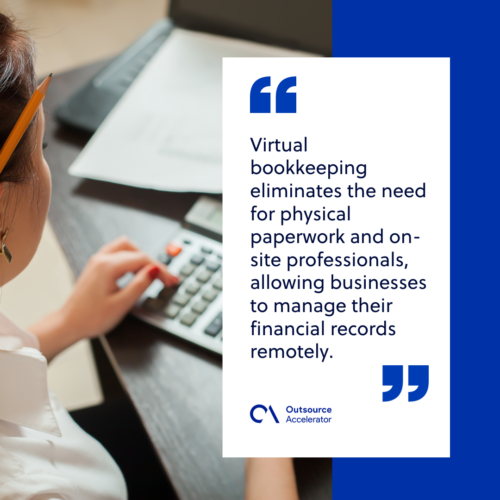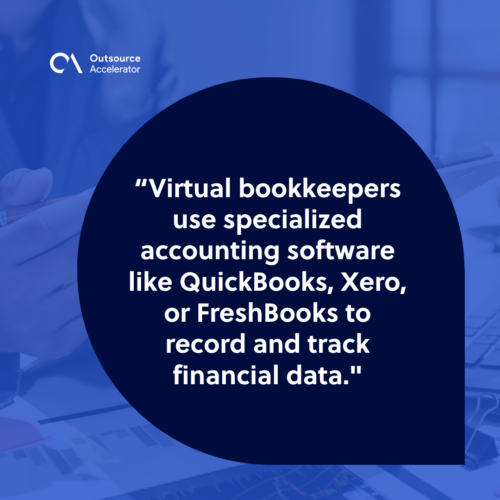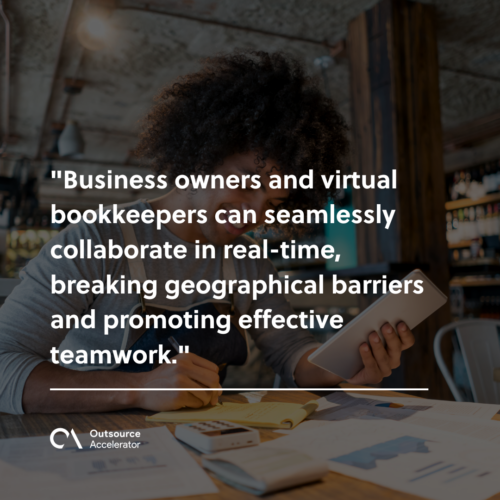Virtual bookkeeping: How it works

The concept of virtual offices has ushered in a new era of virtual solutions.
Other enterprises remain skeptical about embracing virtual approaches due to perceived risks. However, certain industries, particularly accounting and finance, have embraced this modern paradigm.
Traditionally, bookkeeping has been synonymous with physical ledgers, paperwork, and on-site professionals meticulously recording financial transactions. Remote work, driven by technological advancements, has now reshaped this landscape.
Within this context, virtual bookkeeping emerged as one of the vital business processes that makes the workload more manageable for bookkeepers.
What is virtual bookkeeping?
Virtual bookkeeping is a modern approach to financial management. It leverages digital technology to streamline and optimize the traditional process of recording and organizing financial transactions.
Virtual bookkeeping eliminates the need for physical paperwork and on-site professionals, allowing businesses to manage their financial records remotely.

The virtual bookkeeping process
Virtual bookkeeping involves systematically organizing and categorizing transactions via accounting software. The digital records are then reconciled with bank and credit card statements to generate a comprehensive financial report.
This transition to a virtual model enhances the efficiency of data organization and enables real-time collaboration and analysis.
Let’s explore how virtual bookkeeping works in detail:
Organize and categorize transactions
The first step in virtual bookkeeping involves organizing and categorizing financial transactions. This includes systematically classifying income, expenses, assets, and liabilities.
Digital tools and software are essential in virtual bookkeeping to ensure accurate categorization and reduce the likelihood of errors associated with manual methods.
Enter transactions into accounting software
Once transactions are organized, they are entered into accounting software.
Virtual bookkeepers use specialized accounting software like QuickBooks, Xero, or FreshBooks to record and track financial data.
These tools automate much of the data entry process to minimize the risk of discrepancies and enhance overall efficiency.

Reconcile bank and credit card statements
Reconciliation in virtual bookkeeping is where bookkeepers compare the financial transactions recorded in the accounting software with bank and credit card statements. This is to identify any disparities.
This virtual bookkeeping process ensures the accuracy of financial records and provides a clear picture of the company’s financial health.
Challenges of virtual bookkeeping
While virtual bookkeeping offers numerous benefits, it has its challenges. Understanding and addressing the following are crucial for businesses transitioning to a virtual bookkeeping model:
- Security concerns – Virtual bookkeeping faces challenges related to financial data security. The digital nature of the process requires robust cybersecurity measures to safeguard sensitive information from unauthorized access or cyber threats.
- Technical issues – Virtual bookkeeping may encounter technical glitches or software malfunctions like any digital system.
- Training and adaptation – Transitioning to virtual bookkeeping may pose challenges in training staff and ensuring they adapt to new technologies seamlessly.
- Data accuracy – Despite automation, ensuring the accuracy of data entry remains a challenge. Human errors or discrepancies in transaction categorization can impact the reliability of financial records.
- Internet dependence – Virtual bookkeeping relies on internet connectivity. Any disruptions in internet service may hinder real-time collaboration and access to financial data. This may cause delays in critical decision-making processes.
Benefits of virtual bookkeeping
Virtual bookkeeping excels in modern financial practices through the following advantages:
Easy data organization and retrieval
Virtual bookkeeping is a game-changer in simplifying the organization and retrieval of financial data.
By digitizing records and storing them systematically, businesses experience a streamlined process for accessing crucial information. This saves valuable time and mitigates the risk of data loss in traditional, paper-based systems.
Integration with other software
A notable strength of virtual bookkeeping lies in its seamless integration with various business software applications.
This integration extends beyond accounting platforms, linking effortlessly with the following:
- Customer relationship management (CRM) systems
- Inventory management tools
- Payment processors
Interconnectedness creates a cohesive ecosystem where different facets of business operations work in harmony.
The result is heightened overall operational efficiency, as data flows seamlessly between different functions. Virtual bookkeeping also eliminates silos and provides a holistic view of business processes.
This integration enhances productivity and ensures that the financial data is interconnected with other critical aspects of the business for a comprehensive overview.
Accessibility and remote collaboration
Accessibility takes center stage as professionals gain the ability to access financial data from any location with an internet connection. This flexibility not only enhances convenience but also fosters efficient remote collaboration.
Business owners and virtual bookkeepers can seamlessly collaborate in real-time, breaking geographical barriers and promoting effective teamwork.

Environmental sustainability
An often overlooked but significant aspect of virtual bookkeeping is its alignment with sustainability goals.
Virtual bookkeeping contributes to a positive environmental impact by significantly reducing reliance on paper and physical storage.
Traditional bookkeeping practices involve substantial paper usage, leading to environmental consequences. Virtual bookkeeping mitigates this impact by digitizing records and eliminating the need for extensive physical storage.
This shift aligns with the broader global focus on sustainability and reflects a conscious effort by businesses to reduce their carbon footprint.
Where to find a virtual bookkeeper
Businesses can turn to platforms and outsourcing partners such as Outsource Accelerator, Freelancer.com, Upwork, and similar services to hire dedicated and skilled virtual bookkeepers. Enlisting the services of a firm like ConnectOS ensures you get professional output.
These platforms provide a diverse talent pool to meet your virtual bookkeeping needs.







 Independent
Independent




